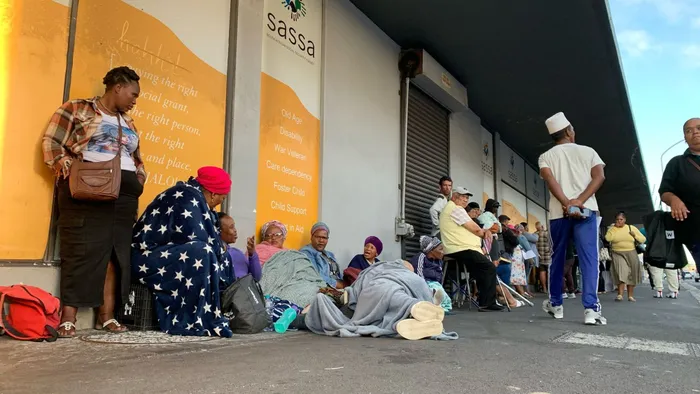Uncertainy looms over social grants payments as Postbank at odds with Sassa
SOCIAL GRANTS

Last week, Sassa announced a three-month extension to the notice period for the termination of the MSA with Postbank, saying the move would provide “time and space” for the executive authority to deliberate on issues between the two entities and offer guidance.
Image: Tracey Adams/IndependentNewspapers
The South African Postbank has taken issue with the South African Social Security Agency (Sassa) over what it describes as a unilateral decision to extend their Master Service Agreement (MSA) by three months, arguing that the matter should instead be determined by a Ministerial Inter-Governmental Committee (IMC).
Last week, Sassa announced a three-month extension to the notice period for the termination of the MSA with Postbank, saying the move would provide “time and space” for the executive authority to deliberate on issues between the two entities and offer guidance.
However, Postbank maintains that the decision undermines a presidential directive made after a high-level government meeting, where it was agreed that an IMC would be established to resolve the dispute.
In a statement last week, Postbank said the existing agreement should remain in force until the IMC is formally constituted and has deliberated on the matter.
“This brings certainty and reassurance to millions of social grant beneficiaries who will continue to use their Postbank black cards and Sassa gold cards with confidence, enjoying uninterrupted access to their grants and associated banking benefits,” the bank said before Sassa announced its three-month determination.
Postbank CEO, Nikki Mbengashe, said the bank requested the creation of the IMC because the MSA itself was established through a Cabinet process, and only a similar mechanism should decide its future.
“While Postbank welcomes the shift from the initial 30 September 2025 deadline, it remains deeply concerning that Sassa has again chosen to impose a notice of termination—this time, three months,” Mbengashe said.
“In our view, no such notice should have been issued at all. It should be retracted to allow the IMC process to run its proper course. To both issue a notice and unilaterally determine its timeframe undermines the fairness and integrity of the dispute resolution process.”
She added that questions regarding the IMC’s establishment, timelines, and terms of reference should be directed to government, which is responsible for convening the committee.
“Postbank, for its part, welcomes the opportunity to present its case before the IMC—on behalf of the three million beneficiaries it currently serves directly, and in essence, all social grant beneficiaries across South Africa,” Mbengashe said.
President Ramaphosa’s intervention follows a North Gauteng High Court ruling that dismissed Postbank’s urgent bid to halt the termination of the MSA, citing a lack of urgency.
Sassa initially issued a six-month notice of termination in December 2023, citing a breakdown in the relationship with Postbank and alleging non-compliance with contractual obligations.
The agency said Postbank’s shortcomings had exposed it to reputational risks. However, Sassa did not respind to Business Report questions sent to it on Friday.
Postbank, which is paid a set fee by Sassa in a clawback arrangement, insists it is acting not only in its own interest but also to protect millions of social grant recipients who may be forced to pay commercial banking fees for services such as balance enquiries, mini-statements, and card replacements if the contract ends.
Sassa has also faced growing criticism over unlawful deductions from beneficiaries’ grants by financial service providers, including insurance companies.
Civil society organisations have reported hundreds of thousands of complaints from beneficiaries whose funds were deducted without consent — allegedly by companies believed to have ties to individuals within Sassa.
Sources outside of government that are close to the grant-payment business said this situation reminded them of the 2018 saga involving Cash Payment Services (CPS) and raises questions about the agency’s relationships with private entities.
"There is no smoking gun, but there are indications that Sassa or some of its officials benefit from the collaboration with commercial entities like banks and insurance companies," the source said.
"We are seeing things based on deductions, it doesn't make sense for Sassa to fight for these contracts. For an example, we have seen CPS, which we know was kicked out of the system for corruption, coming back and has been rebranded and it is playing a big role in that space."
BUSINESS REPORT